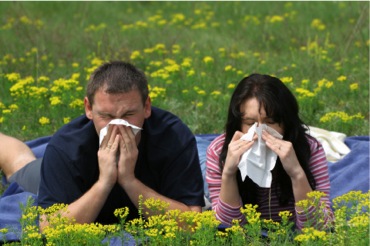by: Dr. Craig A. Maxwell

“Hachoo!” Allergies are the worst. Whether you suffer from seasonal hay fever, chemical sensitivities or food allergies, when your immune system overreacts to something, you suffer. This guide will help you better understand different types of allergies and the natural steps you can take to combat any type of allergy or intolerance.
What are Allergies?
Allergies are an inappropriate response of your immune system to an everyday substance such as dust, mold, ragweed, pollen or food. A person with allergies is hypersensitive to certain substances that trigger histamine release in the body. This histamine release can result in a myriad of annoying and sometimes harmful symptoms.
What are the Symptoms of Allergies?
The symptoms of allergies depend on the type of allergy being experienced.
The most common symptoms of allergies include:
- Upper Respiratory
The most common response to allergies is an upper respiratory response. Allergies to pollen, mold, dust, chemicals, and some foods such as shellfish or nuts can produce reactions such as:
- Sneezing
- Post-nasal drip
- Stuffed nose
- Itchy nose
- Wheezing
- Shortness of breath
- Skin and Eyes
Skin and eyes are often affected by high levels of histamine in the body. Inflammation of the skin and eyes is common in individuals who are allergic to pollen, chemicals, and cosmetics. Food allergies to citrus and gluten can also produce skin and eye reactions such as:
- Itchy, watery eyes
- Hives, rash, eczema
- Gastrointestinal
Gluten and lactose intolerance are common food allergies/intolerances that cause gastrointestinal upset such as:

- Chronic diarrhea
- Bloated belly
- Flatulence, gurgling intestines
- Abdominal pain
- Mental/Behavioral
Believe it or not, allergies also have a mental and behavioral component to them. Individuals with allergies to chemicals, gluten, and food dyes often exhibit behavioral issues that may mimic mental illness. These symptoms include:
- Brain fog
- Irritability
- Confusion
- Psychosis
- Insomnia
Types of Allergies
The four most common types of allergies include seasonal allergies, food allergies, chemical allergies, and household allergies.
Let’s look at them in a bit more detail:
- Seasonal Allergies
Seasonal allergies sufferers dread the spring and fall months. This is because pollen counts are high during these times, resulting in a strong upper respiratory response. Common seasonal allergens include tree pollen, weeds, mold, and grass.
- Food Allergies

Food allergies have several different types of allergic response associated with them. For example, people who are allergic to citrus fruits might find their mouths or tongues itch after eating them. Individuals with gluten intolerance may notice chronic gastrointestinal symptoms and a feeling of ill health that never quite goes away.
People with severe food allergies to nuts and shellfish may experience hives, swelling of the lips, tongue or throat and anaphylaxis, a life-threatening allergic reaction that blocks the airways within a matter of seconds.
- Chemical Allergies
Oftentimes, patients come to my office presenting with unusual symptoms such as hives, rash or difficulty breathing but they aren’t suffering from seasonal or food allergies. The chemicals in their home are to blame. Household cleaning products, detergents, cosmetics, latex, new floors, and new mattresses can all cause chemical allergies with varying degrees of severity.
- Household Allergies
The same goes for household allergies. Oftentimes, a patient will be unaware that a growing patch of mold in their bathroom or a dust-filled shelf in their bedroom is causing them to sneeze and feel miserable. Pet dander is another common cause of household allergies.

Causes of Allergies
The cause of upper respiratory allergies is due to a hyperactive immune system. Your immune system is designed to stand guard and defend against bacteria and viruses so you don’t get sick every time you’re exposed to a cold or flu. In a person with a hyperactive immune system, however, even harmless substances are seen as potential threat. Even just a short exposure to the offending substance can cause the immune system to go into overdrive, releasing chemicals that cause the above-mentioned symptoms.
Food allergies are caused by the same basic reaction. You eat a certain food and your body views it as foreign and begins to attack, causing hives, swelling and other allergic responses. However, when it comes to gluten intolerance, the reaction is a bit different and more severe. In the case of Celiac disease for example, when the intestines are exposed to gluten, the body doesn’t attack the gluten, it attacks the intestines, slowly breaking down the cilli that move food through the digestive system. This causes chronic inflammation, malabsorption of nutrients, pain, and behavioral problems.
Another commonly-overlooked cause of allergies is leaky gut syndrome. In a person with leaky gut syndrome, the lining of the gut is more permeable than it should be, allowing minute particles of food to enter the bloodstream. This causes a chronic inflammatory and allergic response. This can be caused by chronic use of antibiotics, NSAID pain relievers, excessive alcohol consumption, poor diet, and intestinal parasites.
To test for leaky gut syndrome, I recommend Doctor’s Data Comprehensive Stool Analysis x 3 DD Kit, which evaluates for parasites, all strains of yeast, leaky gut, dysbiotic bacteria, digestive enzymes, digestion capability, and even a count of all probiotics!
Natural Remedies for Allergies
When it comes to treating allergies, over-the-counter antihistamines may work to stop the symptoms, but they do nothing to address the underlying cause of the allergic reaction, which is a hyperactive immune system.
Here are my suggestions for dealing with allergies naturally:

- Dietary Changes
A healthy body begins with a healthy diet. A diet rich in processed foods such as refined carbohydrates and sugars can contribute to leaky gut syndrome and hyperactive immune response. Foods containing dyes, preservatives, and additives can also contribute to chronic, low-grade allergic reaction. To support and balance the immune system, I recommend a whole-food diet. This means cutting the junk and loading up on anti-inflammatory foods such as leafy green vegetables, garlic, and cayenne as well as organic meat, poultry, and fish.
To address possible food allergies, I recommend trying an elimination diet and removing all the major allergens such as gluten, lactose, eggs, shellfish, nuts, and citrus. This can be a daunting task but it is well worth it to figure out what’s causing your miserable upper respiratory or GI symptoms. Believe it or not, there are plenty of foods to eat on an elimination diet. You just have to be patient and attentive during your diet and pay attention to how you’re feeling.
If you simply don’t have the time or the patience to deal with a food allergy elimination diet, I recommend the Alcat Comprehensive Wellness 1-Kit, which tells you exactly what foods and chemicals you are sensitive too, and how severely.
- Avoidance of Allergens
Though it’s not possible to avoid all allergens, you can take some steps to cut down on allergic response. This means vacuuming and dusting regularly to cut down on dust mite allergy. Regularly cleaning your bathroom, basement and other dark, damp areas can eliminate mold patches while switching to hypoallergenic laundry detergent, cosmetics, and household cleaning products can cut down on rashes and hives. When cleaning, wear a respirator and keep your home well-ventilated.
- Air Filters

Investing in an air filter or two in your home can also cut down on chronic allergic response. Air filters trap common allergens such as pollen, dust, and mold spores so you can breathe easier.
- Purifying Plants
You can also cut down on allergens in your home but picking out some purifying plants. Palms are excellent plants to purify the home if someone who lives with you smokes. They especially target and remove formaldehyde, benzene and carbon monoxide from your home. Ferns are good for people with chemical allergies as they actively absorb toluene and xylene, additives commonly found in nail polish, glue, and paint. A dracaena plant helps to purify your home by trapping allergens within its leaves.
- Supplements
For allergy sufferers, there are more options than just antihistamines. For my patients, I recommend a blend of supplements to provide immune system support, lower inflammation, and decrease allergic response.
These supplements include:
Diamond Nutritional’s Foundation Vitamins
Even if you’re already taking a dietary supplement, it could be making your allergies worse. That’s right. Most store-bought vitamins are nothing more than a collection of chemicals created in a lab. For optimum nutrition, you need a whole-food source.
That’s why I recommend Diamond Nutritional’s Foundation Vitamins. It is a whole-food dietary supplement, designed to give you the complete nutrition your body needs to combat chronic allergies and keep your body functioning at its best.
Foundation’s ingredients include:
- Vitamin A – 7,500 IU
- Vitamin C – 500 mg
- Vitamin D3 – 500 IU
- Vitamin E – 100 IU
- Vitamin K – 50 mcg
- Thiamine – 25 mg
- Riboflavin – 25 mg
- Niacin – 25 mg
- Vitamin B6 – 38 mg
- Folic Acid – 400 mcg
- Vitamin B12 – 500 mcg
- Biotin – 200 mcg
- Panthothenic Acid – 150 mg
- Calcium – 100 mg
- Iodine – 113 mcg
- Magnesium – 200 mg
- Zinc – 10 mg
- Selenium – 100 mcg
- Copper – 1 mg
- Manganese – 2.5 mg
- Chromium – 200 mcg
- Molybdenum – 25 mcg
- Potassium – 50 mg
- Choline Bitartrate USP – 50 mg
- Inositol – 50 mg
- Mixed Tocopherols – 50 mg
- Lipoic Acid – 25 mg
- N-Acetyl-Cysteine USP – 25 mg
- Rutin – 25 mg
- Lutein – 3 mg
- Boron – 1.5 mg
- Lycopene – 1 mg
- Vanadyl Sulfate Hydrate – 1 mg
Diamond Nutritional’s Ultra Probiotic Formula
There is a strong connection between low gut flora and chronic allergies. Up to 70% of your immune system is located in your gut so if your gut bacteria is low, your immune system may be hyperactive. Adding a good quality probiotic supplement to your diet can reduce chronic inflammation and cut down on allergic response.
For my allergic patients, I recommend Diamond Nutritional’s Ultra Probiotic Formula. Unlike other probiotic, which only contain 1 or 2 active cultures in a low-dose capsule, each packet of Ultra Probiotic Formula contains 225 billion CFUs (colony-forming units) complete with six unique probiotic strains to populate your gut fast and relieve the itching, sneezing, inflammation, and watery eyes associated with allergies.
These strains include lactobacillus plantarum, lactobacillus acidophilus, bifidobacterium lactis, lactobacillus salivarius, lactobacillus casei, and bifidobacterium bifidum.
Diamond Nutritional’s Sinus Formula
In addition to a good whole-food foundation supplement and a quality probiotic, I also recommend Diamond Nutritional’s Sinus Formula for my allergic patients. It contains a synergistic blend of ingredients designed to stop allergic response before it starts.
These ingredients include:
- Vitamin C – 150 mg
Vitamin C is a potent anti-inflammatory and antioxidant that provides immune system support to ease chronic allergies.
- Quercetin Dihydrate – 200 mg
This biologically-active flavonoid prevents the release of histamine, blocking chronic allergic response.
- Stinging Nettles Leaf – 200 mg
Stinging nettle is a natural anti-inflammatory that eases nasal inflammation and skin rash.
- Bromelain – 50 mg
This natural pineapple-based digestive aid improves digestion and elimination while cutting down on the inflammatory response. Bromelain also acts as a smooth muscle relaxant and decreases bronchial mucus.
- N-Acetyl-L-Cysteine USP – 25 mg
N-Acetyl-L-Cysteine USP eases chronic bronchitis and hay fever symptoms while supporting the immune system.
No matter what type of allergy you’re suffering from, you don’t have to live with them forever. There are plenty of natural lifestyle and dietary changes you can make to support your immune system and get your body back in balance!









